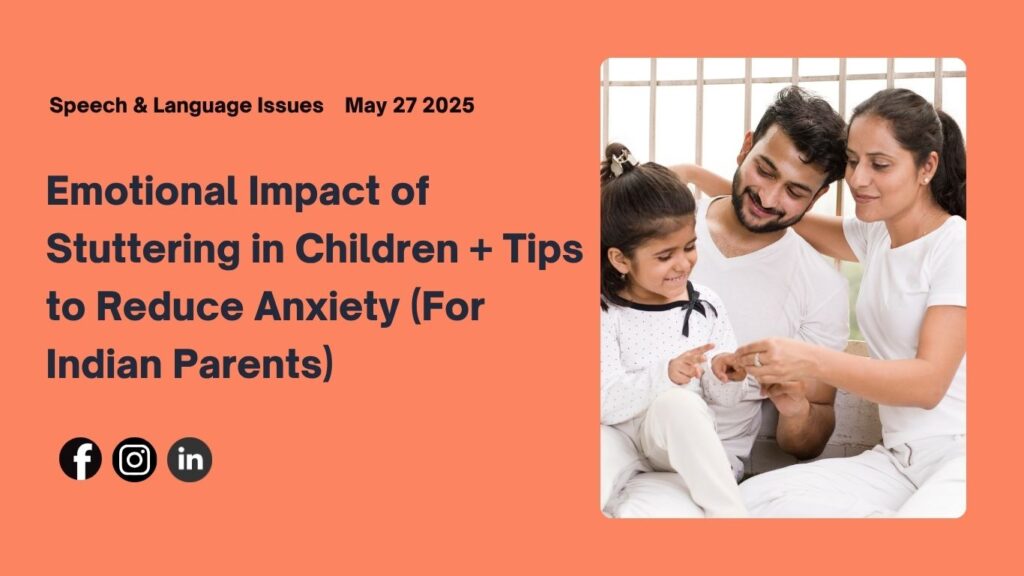
Stuttering in children is more than just a speech pattern—it often brings along emotional struggles like anxiety, embarrassment, and low self-confidence. If your child hesitates while speaking, especially in school or social situations, it’s important to understand that their emotional well-being is just as important as their speech fluency.
In this blog, we’ll explore the emotions associated with stuttering and share simple, parent-friendly tips to manage anxiety—especially useful for Indian families navigating school pressure and social expectations.
Emotional Impact of Stuttering in Children: What Parents Should Know
Children who experience stammering or stuttering often face a mix of emotions that can impact their daily life and self-esteem:
- Anxiety: Many kids feel nervous or fearful when asked to speak aloud, especially in Indian schools where public speaking and oral recitation are common.
- Embarrassment: They may feel self-conscious about their speech disfluency, leading to hesitation and withdrawal from group conversations.
- Frustration or Anger: When children struggle to express themselves, they can become upset or even avoid talking altogether.
These emotions can lead to a vicious cycle: more anxiety → more stuttering → even more anxiety.
Tips to Manage the Emotional Impact of Stuttering in Children at Home
Here are some evidence-backed, easy-to-apply strategies for reducing speech anxiety in kids:
- Practice Deep Breathing
Teach your child to take slow, deep breaths before speaking. This simple relaxation technique helps calm nerves and reduce tension in speaking situations.
- Try Grounding Exercises
Ask your child to focus on what they can see, touch, hear, and feel. It brings their attention to the present and away from fear-based thinking.
- Positive Reinforcement
Praise your child’s effort to speak—not just fluency. Focus on the message, not the mistakes.
“You explained your idea so clearly!”
“I loved how you shared that story!”
- Prepare for Speaking Situations
Use role-play to practice conversations—like ordering food, answering the teacher, or introducing themselves. This builds speaking confidence in real-life scenarios.
- Seek Professional Help
A speech-language pathologist trained in stuttering therapy can provide personalized strategies to help both fluency and emotional regulation. For more detailed guidance on stuttering and professional support, visit the Stuttering Foundation a trusted resource for parents and professionals worldwide.
Emotional Support at Home: Addressing the Emotional Impact of Stuttering in Children
Parents play a powerful role in helping children feel safe and confident while speaking:
- Listen Actively: Let your child express without finishing their sentences or correcting them. Give full attention.
- Normalize Their Experience: Say things like, “Lots of kids repeat words sometimes. It’s okay.”
- Encourage Expression: Talk openly about feelings. Ask how they feel about school, talking, or any recent moments of stress.
- Educate Others: Talk to teachers and relatives. Explain that stammering is not a sign of low intelligence or nervousness—it’s just a speech pattern some children experience.
Emotional Impact of Stuttering in Children: Indian School Pressure & Local Parenting Insight
In many Indian schools, there’s a heavy emphasis on oral performance, elocution, and being “well-spoken.” Kids who stutter may feel extra pressure to “speak clearly” or “speak fast like others.”
If your child is in LKG, UKG, or primary classes, it’s important to:
- Speak with school teachers or counselors
- Request a non-judgmental speaking environment
- Reduce pressure during speech-related school activities
At Neuronurture Kids, we believe that helping children speak confidently is about supporting both their speech and their emotions. Our online speech therapy sessions are: Led by certified Indian therapists, Designed for kids aged 2 to 10, Focused on anxiety-free communication, Available from the comfort of your home.
We understand that every child’s journey is unique, and our personalized approach ensures your child gets the care they need in a supportive environment. Together, we can help your child overcome the emotional impact of stuttering and build lasting communication skills. Learn more about our compassionate approach at Neuronurture Kids.